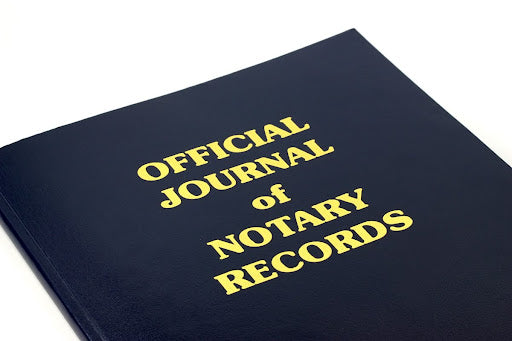
As a notary public, your journal is your professional lifeline. This record-keeping tool serves as legal protection, memory aid, and proof of your diligence all rolled into one. Yet many notaries don't fully appreciate the power of proper journal maintenance until they face a legal challenge or audit. Your notary journal deserves more attention, and believe it or not, it can actually make your notarial practice stronger and more profitable.
Legal Protection When You Need It Most
When questions arise about past notarizations, your notary journal functions as your first line of defense. Think about this scenario: six months after notarizing a document, you receive a call from an attorney claiming their client never appeared before you. Without a journal, you're left with only your memory to rely on. With a properly maintained journal, you can quickly reference the date, document type, signature, and possibly even a fingerprint to prove the notarization happened correctly.
The law in most states requires notaries to maintain journals for good reason. These records create an audit trail that can protect you from liability claims. Many notaries have avoided costly legal battles simply by producing well-kept journals with clear entries showing they followed proper procedures. Your journal entries establish that you verified identities, confirmed signers understood what they signed, and completed all required steps under notary law.
Time-Saving Record Management
How many times have you struggled to recall details about a notarization you performed weeks or months ago? Your journal eliminates this memory burden by creating an organized system for tracking every transaction you notarize. This becomes incredibly valuable when:
-
A client calls asking for another copy of a document you notarized last year.
-
You need to verify if someone previously used your services for bond paperwork.
-
You're completing your annual notary activity reports.
-
You're filing your taxes and need to track your notarial income.
A good journal layout separates entries clearly and includes space for all relevant information without cramming. The best journals provide ample room for signer information, document details, and identification methods used.
Additionally, when you maintain consistent journal entries, you create patterns that help you work more efficiently. You'll notice which types of documents require extra time, which identification methods work best, and how to schedule your appointments more effectively based on past experience.
Building Client Trust and Professionalism
Your journal demonstrates your professionalism to clients. When you pull out a clean, well-maintained hardcover journal and carefully record each transaction, you signal to clients that you take your role seriously.
Clients notice these details. The care you take with your journal often translates to a higher perceived value of your services. The paper quality in your journal matters, too. Premium bond paper stands up to repeated use and creates a more professional impression than flimsy pages. Clients who see you investing in quality tools are more likely to value your services appropriately.
Your journal also helps standardize your client interactions. The structured format reminds you to collect all necessary information consistently, which reduces errors and helps you appear more confident and prepared during each appointment.
Simplified Business Growth Tracking
Your notary journal is a powerful business intelligence tool. Each entry creates a data point that helps you understand and grow your notary practice. With consistent journal entries, you can:
-
Track which services are most requested
-
Identify your busiest days and times
-
Monitor which referral sources bring you the most business
-
Calculate your average fee per transaction
-
Measure customer retention rates
This information proves invaluable when making business decisions. For example, if your journal reveals that real estate closings make up 70% of your business but take twice as long as other notarizations, you might adjust your fee structure accordingly. Or, if you notice a spike in demand for loan signings during certain months, you can plan your availability to maximize those opportunities.
Many notaries who closely analyze their journal data discover untapped market niches.
Insurance Against Potential Challenges
Think of your notary journal as professional insurance against challenges to your work. While your notary bond provides financial protection, your journal provides evidential protection that can prevent claims from progressing in the first place.
When a signer later claims they didn't understand what they were signing, your detailed journal entry showing you explained the document proves you fulfilled your duty. If someone alleges document fraud, your journal can help establish the timeline of events and demonstrate you followed proper procedures.
The physical format of your journal matters for this protection, too. A bound book with numbered pages makes it obvious if entries have been altered or removed. Some notaries prefer journals with carbon copies or duplicate pages to provide copies of entries while maintaining their original records.
Equipping Yourself for Notarial Success
Have you equipped yourself with all the supplies you need to succeed as a notary public? It's clear that your notary journal does much more than satisfy legal requirements. Our company can provide the products and accessories you need to grow as a notary public in many ways. That includes our Soft Cover Notary Public Journal and our Official Notary Public Journal Hardbound.
We take pride in offering journals designed specifically for the practical needs of working notaries, with layouts that make record-keeping straightforward and materials that stand up to daily use.
Your journal is the backbone of your notary business, so make sure you're using one that meets your needs and enhances your professional reputation.
